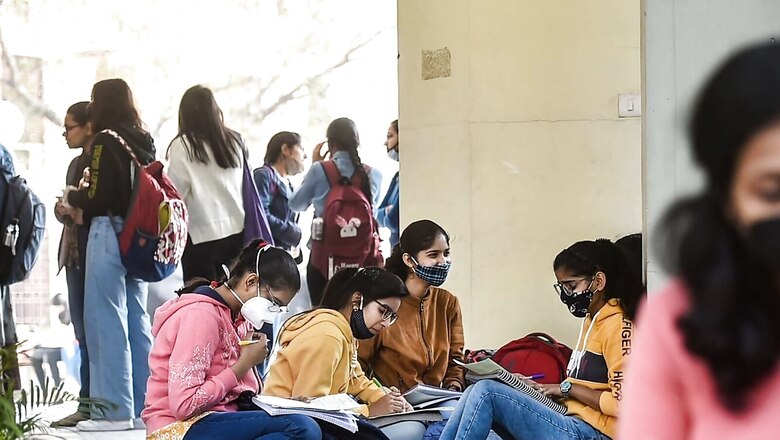
views
The iconic University of Calcutta recently turned out to be a perfect example of how the Vice Chancellor of a state-run university can become a victim of an ego tussle between a state government and the governor, resulting in faulty application of an emergency clause regarding the appointment or reappointment of a Vice-Chancellor.
Legal experts have sounded a note of caution that the West Bengal government had made a similar faulty application of the related clause in the case of 24 other state universities and unless the state government immediately rectifies that application error, there are chances that the Vice Chancellors there will meet a similar fate like that of the erstwhile Vice Chancellor of the University of Calcutta, Sonali Chakraborti Banerjee, who faced the unceremonious cancellation of her reappointment.
Both the state government and Banerjee took legal steps to ensure that the reappointment decision stays. But first, the division bench of the Calcutta High Court and then the Supreme Court quashed her reappointment.
Former Registrar of Calcutta University, Rajagopal Dhar Chakraborty feels that what prompted the state government to apply this clause in her reappointment was the desire to bypass the then state governor and now Vice President, Jagdeep Dhankhar. This tussle between the Governor and the state government intensified as the government passed a bill in the Assembly that sought to replace the Governor with the Chief Minister as the Chancellor in all the state-run universities.
Similarly, another bill was passed to replace the Governor with the Education Minister as the Visitor in all private universities in the state.
Now what was the legal clause that the state government used in giving Bannerjee the reappointment? It applied the ‘Removal of difficulties’ clause under Section 60 of the Calcutta University Act, 1979 in her reappointment, which ultimately made the process ‘unconstitutional and illegal’.
Legal experts like High Court counsel, Jyoti Prakash Khan feel that the ‘Removal of difficulties’ clause is applicable only in case of emergency situations, where the post of the Vice Chancellor becomes vacant suddenly either because of his or her sudden resignation or any reason which is beyond human control. In that case the state government could have applied this clause for appointment of someone as a working Vice Chancellor till the time a fresh appointment is made. In such a situation the consent of the Governor is not required since the appointment is made for an interim period.
Legal experts feel that in case of the appointment of a full-time Vice Chancellor or even reappointment of the existing Vice Chancellor, the state government will have to abide by the University Grants Commission Act, 1956 and in that case the consent of the Governor is mandatory. In the case of the reappointment of Banerjee, the state government applied that clause bypassing Governor Jagdeep Dhankhar. In fact, the decisions of both the division bench of the Calcutta High Court and the Supreme Court cited this faulty clause application as the reason for quashing her re-appointment.
As per the records of the West Bengal Education Department, Banerjee, daughter of Bengali poet late Nirendranath Chakraborti and wife of former state Chief Secretary and the current chief advisor to the state government, Alapan Banerjee, was first appointed in 2017. That appointment was done as per the UGC norms taking the consent of then Governor, Keshari Nath Tripathi. However, in 2021 she was reappointed by the state government without the consent of Governor Jagdeep Dhankhar.
During her tenure as the University of Calcutta Vice Chancellor, Sonali Banerjee’s name was dragged into a controversy after the university authorities conferred a honorary D.Litt on Chief Minister Mamata Banerjee.
Opposition parties claimed that her reappointment was a reward for that. Secondly, as pointed out by senior counsel Kaushik Gupta that in a subject like education, which is in the concurrent list, the state government cannot take any decision that goes against the Central Act in the matter and if any state Act or amendment in the Act has a tussle with a Central Act in a matter related to any concurrent list subject, the clause of the Central Act will be supreme.
State government sources pointed out that the Education Department has given similar reappointments to the Vice Chancellors of 24 other state universities by applying the same “removal of difficulties” clause under Section 60 of the Calcutta University Act, 1979 and again without the consent of Dhankhar.
Already PILs challenging some of these 24 reappointments are in the Calcutta High Court. And if the orders of the Calcutta High Court and the Supreme Court are taken as precedents, there is every possibility that the state government will have yet another loss of face in the court unless that is rectified and fresh appointments or reappointments are made for those chairs with the consent of Governor La Ganesan.
However, former principal of the then Presidency College, Amal Kumar Mukherjee, feels that in the entire process, Banerjee is the one who suffered a public loss of face and the rich heritage of education in West Bengal has been shamed.
There is a view that the Governor should have the ultimate authority on this count to prevent the state government from making appointments or reappointments to fulfil the ruling party’s agenda.
There is another view held by educationists that ideally the practice of appointing a Vice Chancellor either through a search committee of experts and educationists or through a secret ballot by the members of the working committee should prevail.
Read all the Latest Education News here













Comments
0 comment